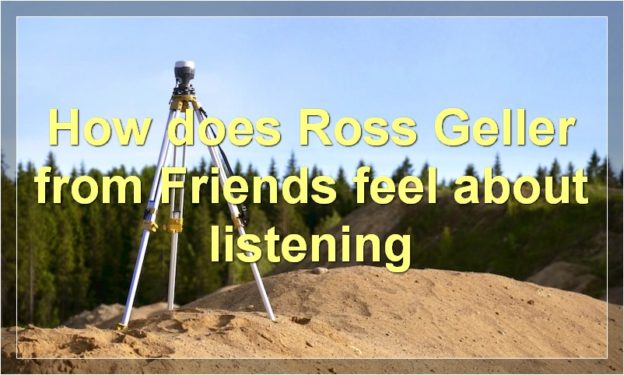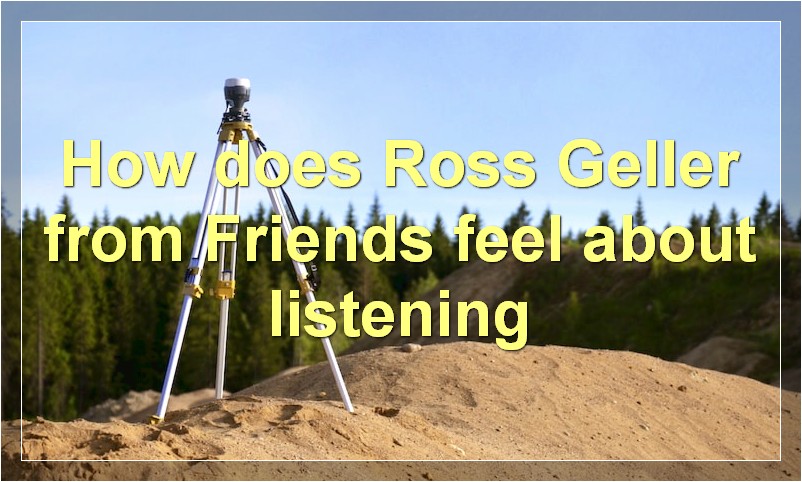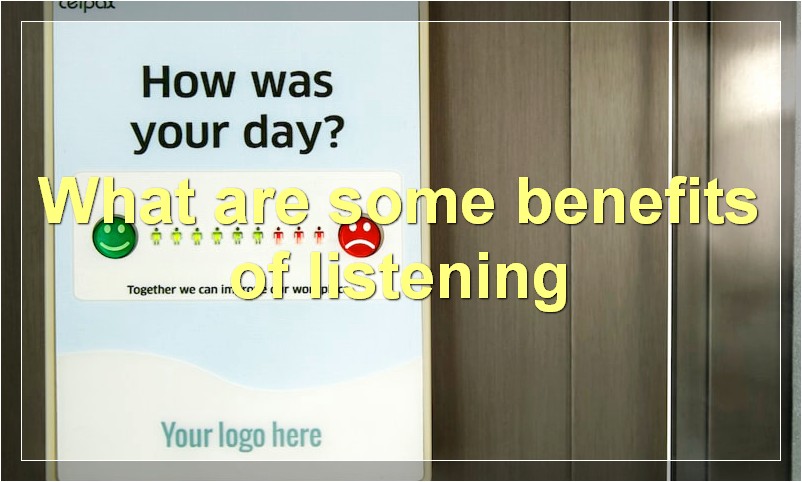You may not realize it, but Ross Geller from the popular sitcom Friends is actually a great example of the importance of listening.
What does Ross Geller from Friends listen to
Ross Geller from Friends is a big fan of music. He loves all genres of music and enjoys listening to it whenever he can. Ross is particularly fond of the Beatles, and he often plays their music when he’s feeling down or needs some motivation.
How does Ross Geller from Friends feel about listening
Ross Geller from Friends feels great about listening! He feels like he’s a part of the conversation and that he’s able to really connect with the person he’s talking to. Additionally, Ross feels like he gets to know the person better when he’s able to listen to them and learn about their life.
What is the difference between listening and hearing
There is a big difference between listening and hearing. When you hear something, it is simply registering in your brain. Listening requires engaging with what you are hearing. It means making an effort to understand and comprehend the message that is being communicated.
Hearing is a passive process while listening is an active one. When you are actively listening, you are not only hearing the words that are being said but also trying to interpret their meaning. You are also paying attention to the speaker’s body language and tone of voice. All of this information helps you to understand the message that is being conveyed.
Listening is a skill that needs to be developed. It takes practice and concentration. The ability to listen attentively is important in both personal and professional life. Being a good listener can help you to build better relationships, resolve conflicts and make better decisions.
How can we improve our listening skills
We can improve our listening skills by practicing active listening. Active listening is a skill that involves paying attention to the speaker, understanding their message, and responding in a way that shows we understand. When we are actively listening, we are not just hearing the words that are being said, but we are also taking in the nonverbal cues, such as body language and tone of voice, that can help us better understand the speaker’s message.
What are some active listening techniques
There are a number of ways to be a better listener, including:
1. Pay attention: This may seem obvious, but it’s important to actually focus on the person speaking, rather than letting your mind wander.
2. Show that you’re listening: Nod your head, make eye contact, and use other nonverbal cues to let the speaker know you’re engaged in the conversation.
3. Don’t interrupt: It can be tempting to jump in with your own thoughts or stories when someone else is talking, but resist the urge and wait until they’re finished.
4. Ask questions: Asking questions shows that you’re interested in what the other person has to say and can help to clarify any points that you’re not sure about.
5. Repeat back what you’ve heard: This is a great way to check that you’ve understood what was said and also gives the speaker the opportunity to correct anything you may have misunderstood.
What are some benefits of listening
There are many benefits to listening, both for the individual and for society as a whole. Listening is a skill that can be learned and developed, and like any skill, it takes practice to get better at it. Here are some of the benefits of listening:
1. Improved communication: Good listeners tend to be better communicators. This is because they are able to understand what other people are saying and they know how to respond effectively. When you listen well, you are more likely to be able to build rapport with others and resolve conflicts.
2. Enhanced relationships: Good listeners usually have better relationships. This is because they make an effort to understand what others are saying and they show that they care about others by giving them their full attention. People feel appreciated when we take the time to really listen to them.
3. Greater success: Good listeners tend to be more successful in life. This is because they are able to gather information and learn from others. They also tend to be better at problem-solving and decision-making because they have considered all sides of an issue.
4. Improved mental health: Listening can also be beneficial for our mental health. When we listen to others, we can gain a different perspective on our own problems and worries. It can also help us to feel connected to others and less alone.
What are some barriers to listening
Some barriers to listening include:
-Preoccupation with other thoughts
-External distractions
-Internal distractions (e.g. daydreaming)
-Lack of interest in the topic
-Difficulty understanding the speaker
-Evaluating or judging the speaker instead of listening
-Thinking about what to say next instead of listening
How can we overcome those barriers
There are many ways that we can overcome the barriers in our lives. One way is to take on a new challenge. When we are presented with a new challenge, it can help us to see things in a different light and to find new ways to overcome the obstacles in our way. Another way to overcome the barriers in our lives is to change our perspective. Sometimes, all it takes is to look at things from a different angle to see that there are other options available to us. Lastly, we can also ask for help from others when we are struggling. There is no shame in admitting that we need assistance and by doing so, we can open up new avenues for support and growth.
What is the difference between listening and simply hearing someone
There is a big difference between listening and simply hearing someone. When you are just hearing someone, you are passively taking in the information that they are saying without really processing it. On the other hand, when you are listening to someone, you are actively trying to understand what they are saying and engage with them in conversation.
In order to be a good listener, you need to be able to pay attention to the speaker and give them your full attention. You also need to be able to understand what they are saying and ask questions if you need clarification. Lastly, you need to be able to respond thoughtfully to what the person has said. Simply hearing someone is not enough – if you want to have a meaningful conversation, you need to make sure that you are truly listening to the other person.
Can we listen without judgement
If we can learn to listen without judgement, we can open our minds to new perspectives and experiences. This can lead to personal growth and a better understanding of the world around us. Additionally, it can help build strong relationships with others as we learn to truly hear them.



